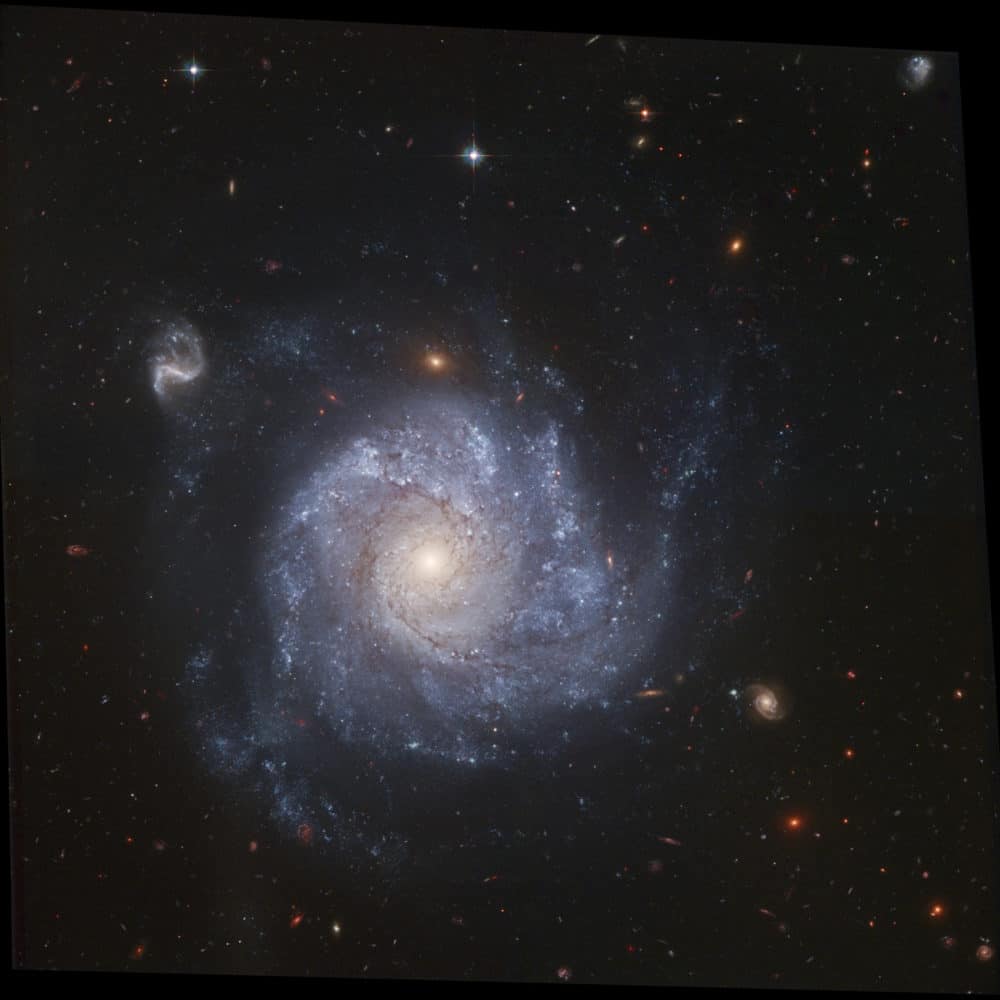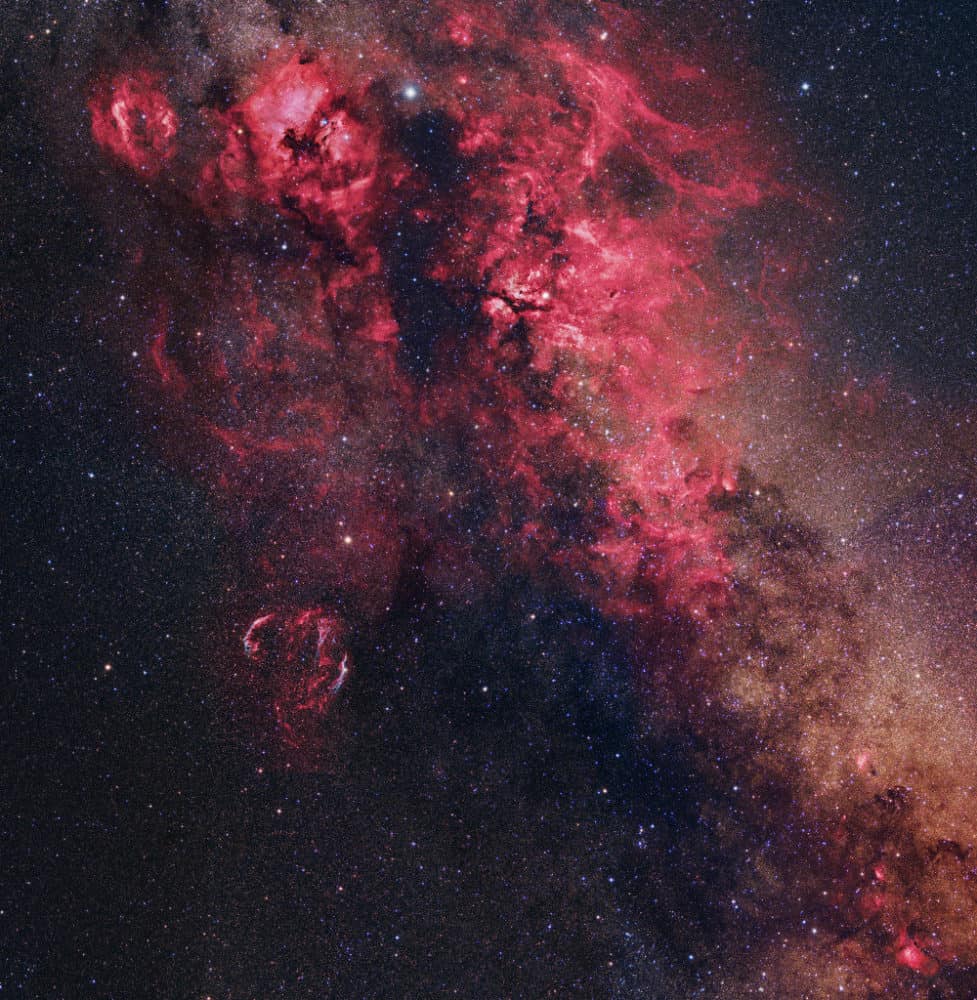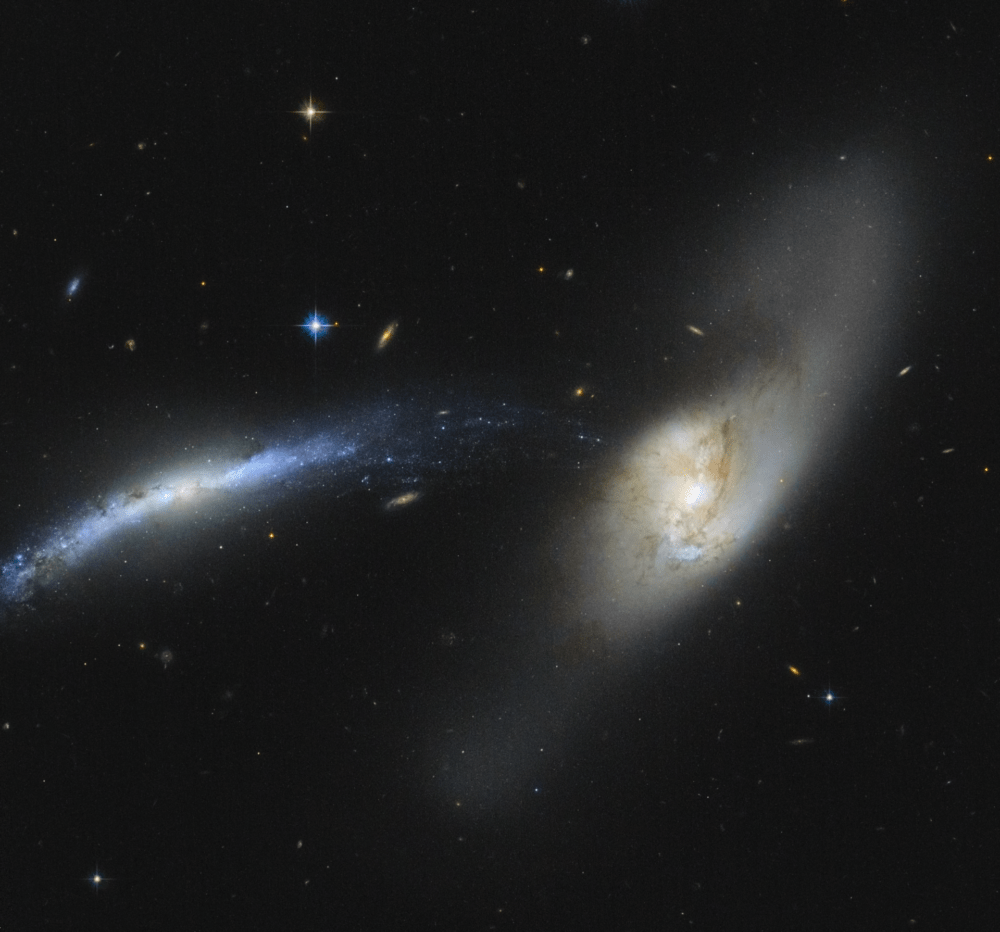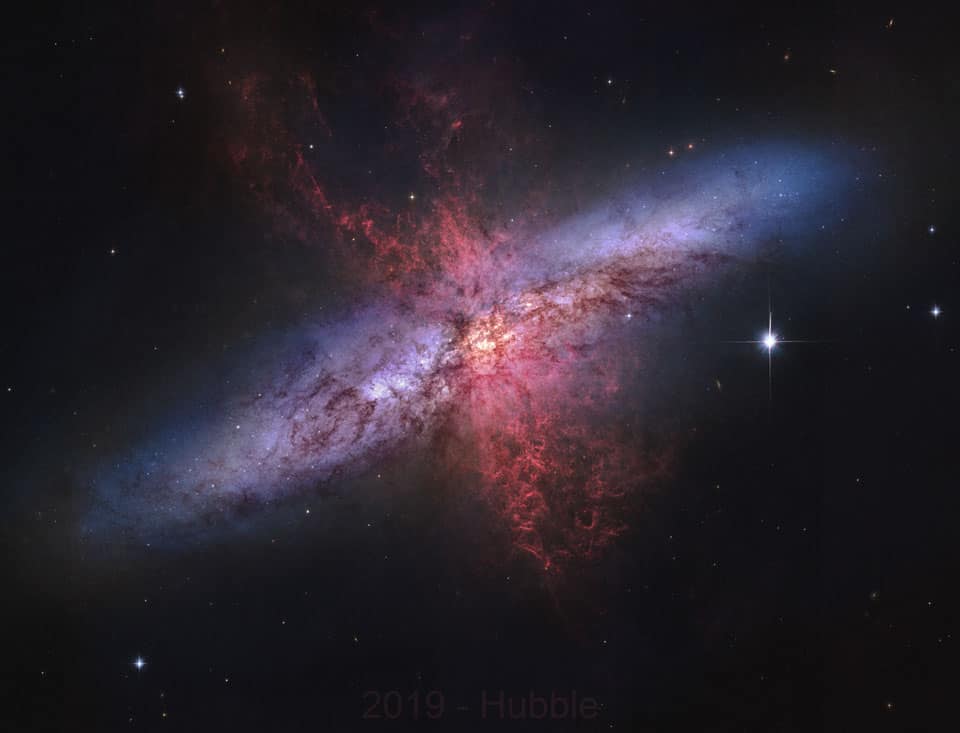Blog
NGC 1309 is a spiral galaxy located approximately 120 million light-years away, appearing in the constellation Eridanus. It is about 75,000 light-years across, and is about 3/4s the width of the Milky Way. Its shape is classified as SA(s)bc, meaning that it has moderately wound spiral arms and no ring. Bright blue areas of star formation can be seen in the spiral arms, while the yellowish central nucleus contains older-population stars. NGC 1309 is one of over 200 members of the Eridanus Group of galaxies.
more...Jonathan “Juanito” Pascual (born July 26, 1973) is an American-born flamenco guitarist and composer.
In 2011 Pascual formed the Juanito Pascual New Flamenco Trio with percussionist Tupac Mantilla, and bassist Brad Barrett (Haggai Cohen Milo, in the first iteration). The Trio’s self-titled release came out in Feb. 2014, creating a sound that merges flamenco with elements of jazz, rock and world-music influences.
He has collaborated with numerous environmental projects, and has an ongoing relationship with Earth Train and their Junglewood project in the Panamanian rain forest. In fall of 2013 he was invited to perform at Panama’s Biodiversity Museum in association with National Geographic to celebrate Earth Train’s collaboration with Jane Goodall.
A graduate with honors from Boston’s New England Conservatory of Music from their Contemporary Improvisation program in 1997.
more...Joanne Brackeen (born Joanne Grogan; July 26, 1938) is an American jazz pianist and music educator. Joanne Grogan was born in Ventura, California and attended the Los Angeles Conservatory of Music. She was a fan of pop pianist Frankie Carle before she became enamored with the music of Charlie Parker. In the 1950s she performed with Dexter Gordon, Teddy Edwards, and Charles Brackeen. She and Brackeen married and moved to New York City in 1965. She performed with Chick Corea, Freddie McCoy, and Ornette Coleman.
She played with Joe Henderson (1972–75) and Stan Getz (1975–77) before leading her own trio and quartet. Brackeen established herself as a cutting edge pianist and composer through her appearances around the world, and her solo performances also cemented her reputation as one of the most innovative and dynamic of pianists. Her trios featured such noted players as Clint Houston, Eddie Gómez, John Patitucci, Jack DeJohnette, Cecil McBee, and Billy Hart.
She served on the grant panel for the National Endowment for the Arts, toured the Middle East with the US State Department as sponsor, and had solo performances at Carnegie Hall.
She has recorded over twenty albums as a lead musician and is a professor at the Berklee College of Music and at The New School.
more...Erskine Ramsay Hawkins (July 26, 1914 – November 11, 1993) was an American trumpeter and big band leader from Birmingham, Alabama, dubbed “The 20th Century Gabriel”. He is most remembered for composing the jazz standard “Tuxedo Junction” (1939) with saxophonist and arranger Bill Johnson. The song became a popular hit during World War II, rising to No. 7 nationally (version by the Erskine Hawkins Orchestra) and to No. 1 nationally (version by the Glenn Miller Orchestra). Vocalists who were featured with Erskine’s orchestra include Ida James, Delores Brown, and Della Reese. Hawkins was named after Alabama industrialist Erskine Ramsay.
Erskine Hawkins was named by his parents after Alabama industrialist Erskine Ramsay who was rewarding parents with savings accounts for them for doing so. Hawkins attended Councill Elementary School and Industrial High School (now known as Parker High School) in Birmingham, Alabama. At Industrial High School, he played in the band directed by Fess Whatley, a teacher who trained numerous African-American musicians, many of whom populated the bands of famed band leaders such as Duke Ellington, Lucky Millinder, Louis Armstrong and Skitch Henderson (of the NBC Orchestra.)
more...
Flamenco Fridays with Zambra.
Zambra (Spanish pronunciation: [ˈθambɾa]), (from Andalusi Arabic Zamra, originally from classical Arabic Zamr) is a style of Flamenco dance, typical of the Gypsies of the provinces of Granada and Almeria (Andalusia, Spain).
It is believed that the Zambra is a continuation of earlier Morisco styles of dance. It became typical during wedding ceremonies, although nowadays it is particularly commonly danced for tourists in the caves of Sacromonte (Granada) and in the caves of Almería. In modern times, it has been espoused by flamenco dancers Carmen Amaya, Lola Flores, and Puela Lunaris. It is danced barefoot with finger cymbals; the blouse is tied under the bust and the skirt is very tight around the hips, then flares out and has a ruffle at the end.
more...
The plane of our Milky Way Galaxy near the northern end of the Great Rift and the constellation Cygnus the Swan. Composed with three different telescopes and about 90 hours of image data the widefield mosaic spans an impressive 24 degrees across the sky. Alpha star of Cygnus, bright, hot, supergiant Deneb lies near top center. Crowded with stars and luminous gas clouds Cygnus is also home to the dark, obscuring Northern Coal Sack Nebula, extending from Deneb toward the center of the view. The reddish glow of star forming regions NGC 7000, the North America Nebula and IC 5070, the Pelican Nebula, are just left of Deneb. The Veil Nebula is a standout below and left of center. A supernova remnant, the Veil is some 1,400 light years away, but many other nebulae and star clusters are identifiable throughout the cosmic scene. Of course, Deneb itself is also known to northern hemisphere skygazers for its place in two asterisms — marking the top of the Northern Cross and a vertex of the Summer Triangle.
Deneb /ˈdɛnɛb/ is a first-magnitude star in the constellation of Cygnus, the swan. Deneb is one of the vertices of the asterism known as the Summer Triangle and the “head” of the Northern Cross. It is the brightest star in Cygnus and the 19th brightest star in the night sky, with an average apparent magnitude of 1.25. A blue-white supergiant, Deneb rivals Rigel as the most luminous first magnitude star. However its distance, and hence luminosity, is poorly known; its luminosity is somewhere between 55,000 and 196,000 times that of the Sun. Its Bayer designation is α Cygni which is Latinised to Alpha Cygni, abbreviated to Alpha Cyg or α Cyg.
Deneb’s adopted distance from the Earth is around 802 parsecs (2,620 ly)
more...Donald Johnson Ellis (July 25, 1934 – December 17, 1978) was an American jazz trumpeter, drummer, composer, and bandleader. He is best known for his extensive musical experimentation, particularly in the area of time signatures. Later in his life he worked as a film composer, contributing a score to 1971’s The French Connection and 1973’s The Seven-Ups. Ellis was born in Los Angeles, California, on July 25, 1934. His father was a Methodist minister and his mother a church organist. He attended West High School in Minneapolis, MN. After attending a Tommy Dorsey Big Band concert, he first became interested in jazz. Other early inspirations were Louis Armstrong and Dizzy Gillespie. He graduated from Boston University in 1956 with a music composition degree.
Cornelius “Johnny” Hodges (July 25, 1907 – May 11, 1970) was an American alto saxophonist, best known for solo work with Duke Ellington‘s big band. He played lead alto in the saxophone section for many years. Hodges was also featured on soprano saxophone, but refused to play soprano after 1946. He is considered one of the definitive alto saxophone players of the big band era (along with Benny Carter).
After beginning his career as a teenager in Boston, Hodges began to travel to New York and played with Lloyd Scott, Sidney Bechet, Luckey Robertsand Chick Webb. When Ellington wanted to expand his band in 1928, Ellington’s clarinet player Barney Bigard recommended Hodges. His playing became one of the identifying voices of the Ellington orchestra. From 1951 to 1955, Hodges left the Duke to lead his own band, but returned shortly before Ellington’s triumphant return to prominence – the orchestra’s performance at the 1956 Newport Jazz Festival.
Hodges was born in the Cambridgeport neighborhood of Cambridge, Massachusetts, to John H. Hodges and Katie Swan Hodges, both originally from Virginia. After moving for a short period of time to North Cambridge, the family moved to Hammond Street in the South End of Boston, where he grew up with baritone saxophonist Harry Carney, and saxophonists Charlie Holmes and Howard E. Johnson.
https://www.youtube.com/watch?v=15pTu_OzAG4
more...Semmangudi Radhakrishna Srinivasa Iyer (25 July 1908 – 31 October 2003) was a Carnatic vocalist. He was the youngest recipient of the Sangeetha Kalanidhi awarded by the Music Academy in 1947 and has received many awards including Padma Bhushan and Padma Vibhushanfrom the Government of India, Sangeet Natak Academy award (1953), Isai Perarignar from Government of Tamil Nadu and Kalidas Samman from Government of Madhya Pradesh. He was affectionately addressed as “Semmangudi Maama” (Semmangudi Uncle) by his disciples. He, along with his contemporaries G.N. Balasubramaniam and Madurai Mani Iyer, are referred to as the 20th century male trinity of Carnatic music. He was also considered the “Pitamaha” or the grand sire of modern Carnatic Music. He was conferred with an honorary doctorate by University of Kerala in 1979.
He was born in Tirukkodikaval, Tanjore district as the third son of Radhakrishna Iyer and Dharmasamvardhini Ammal. He lived with his maternal uncle Tirukkodikaval Krishna Iyer, a violin maestro, until the age of four and after his death, moved back to his parents’ home in Semmangudi, Tiruvarur District. At the age of eight he started learning music from his cousin Semmangudi Narayanaswamy Iyer. This was followed by some rigorous training under Thiruvadaimaruthur Sakharama Rao, a famous Gottuvadhyam exponent, an event considered by Semmangudi as a turning point in his life. This was followed by another training stint with Narayanaswamy Iyer, during which time he learnt a lot of varnams and keerthanams. Then he had a musical apprenticeship with Maharajapuram Viswanatha Iyer. In 1926, he performed his first music recital at Kumbakonam.[6] In 1927 gave a concert in the Madras session of Indian National Congress, another event considered by Semmangudy as a turning point in his life, as it catapulted him into the big league of vidwans at that time. He was known for producing soulful music, highly creative and yet very orthodox, despite a recalcitrant voice.
more...NGC 2798 is a barred spiral galaxy in the constellation Lynx. NGC 2798 and NGC 2799 are listed under the Arp Catalogue as Arp 283 and noted as an “interacting galaxy pair”. Distance 79 M light years.
more...
Charles McPherson (born July 24, 1939) is an American jazz alto saxophonist born in Joplin, Missouri, and raised in Detroit, Michigan, who worked intermittently with Charles Mingus from 1960 to 1974, and as a performer leading his own groups.
McPherson also was commissioned to help record ensemble renditions of pieces from Charlie Parker on the 1988 soundtrack for the film Bird.
more...Billy Taylor (July 24, 1921 – December 28, 2010) was an American jazz pianist, composer, broadcaster and educator. He was the Robert L. Jones Distinguished Professor of Music at East Carolina University in Greenville, and from 1994 was the artistic director for jazz at the John F. Kennedy Center for the Performing Arts in Washington, D.C.
A jazz activist, Taylor sat on the Honorary Founders Board of The Jazz Foundation of America, an organisation he started in 1989, with Ann Ruckert, Herb Storfer and Phoebe Jacobs, to save the homes and the lives of America’s elderly jazz and blues musicians, later including musicians who survived Hurricane Katrina. Taylor was also a jazz educator, who lectured in colleges, served on panels and travelled worldwide as a jazz ambassador. Critic Leonard Featheronce said, “It is almost indisputable that Dr. Billy Taylor is the world’s foremost spokesman for jazz.” Taylor was born in Greenville, North Carolina, but moved to Washington, D.C., when he was five years old. He grew up in a musical family and learned to play different instruments as a child, including guitar, drums and saxophone. He was most successful at the piano, and had classical piano lessons with Henry Grant, who had educated Duke Ellington a generation earlier. Taylor made his first professional appearance playing keyboard at the age of 13 and was paid one dollar.
Taylor moved to New York City after graduation and started playing piano professionally from 1944, first with Ben Webster‘s Quartet on New York’s 52nd Street. The same night he joined Webster’s Quartet, he met Art Tatum, who became his mentor. Among the other musicians Taylor worked with was Machito and his mambo band, from whom he developed a love for Latin music. After an eight-month tour with the Don Redman Orchestra in Europe, Taylor stayed there with his wife, Theodora, and in Paris and the Netherlands. Taylor returned to New York later that year and cooperated with Bob Wyatt and Sylvia Syms at the Royal Roost jazz club and Billie Holiday in a successful show called Holiday on Broadway. A year later, he became the house pianist at Birdland and performed with Charlie Parker, J.J. Johnson, Stan Getz, Dizzy Gillespie and Miles Davis. Taylor played at Birdland longer than any other pianist in the history of the club.[6] In 1949, Taylor published his first book, a textbook about bebop piano styles.
https://www.youtube.com/watch?v=AfyHYijQczk
https://www.youtube.com/watch?v=Yjs1oEFOKVE
more...New Orleans sensation Art Neville keyboardist/composer/vocalist left planet Earth!
https://www.musicradar.com/news/new-orleans-funk-legend-art-neville-dies-aged-81?fbclid=IwAR3TgNdyV3l5Kyc3SboOL2gFCxSj_ZM6hKZ_Txx896FHnwC4eMwyxjEU55A
Here is Art Neville at age 16 with the Hawkettes!
more...M82, as this starburst galaxy is also known, was stirred up by a recent pass near large spiral galaxy M81. This doesn’t fully explain the source of the red-glowing outwardly expanding gas and dust, however. Evidence indicates that this gas and dust is being driven out by the combined emerging particle winds of many stars, together creating a galactic superwind. The dust particles are thought to originate in M82’s interstellar medium and are actually similar in size to particles in cigar smoke. The featured photographic mosaic highlights a specific color of red light strongly emitted by ionizedhydrogen gas, showing detailed filaments of this gas and dust. The filaments extend for over 10,000 light years. The 12-million light-year distant Cigar Galaxy is the brightest galaxy in the sky in infrared light, and can be seen in visible light with a small telescope towards the constellation of the Great Bear (Ursa Major).
more...More Posts
- Echos of Freedom by Kahlil Gibran
- The Cosmos with NGC 6814
- Henry Threadgill Day
- Harold Arlen Day
- World Music with Antonia Jiménez
- Daily Roots with King Horror
- Happy Valentines Day 2019
- Echos of Freedom by Rabindranath Tagore
- The Cosmos with Westerhout 5
- Tim Buckley Day
- Merle Saunders Day
- Fernando Sor Day
- World Music with ALASH
- Daily Roots with the Prophets
- Echos of Freedom by James Baldwin
- The Cosmos with NGC 7923
- Peter Gabriel Day
- Wardell Gray Day
- World Music with Yeni Türkü
- Daily Roots with Culture



